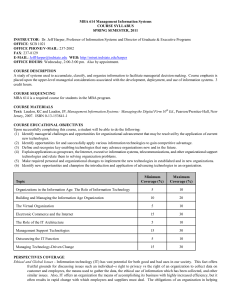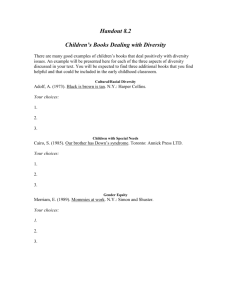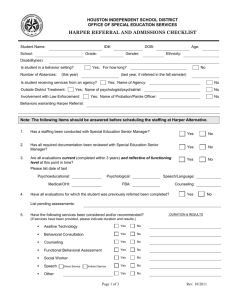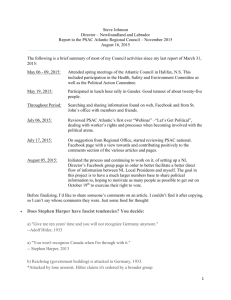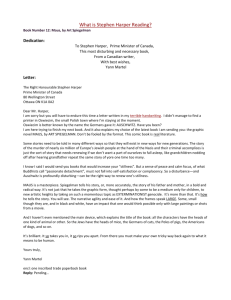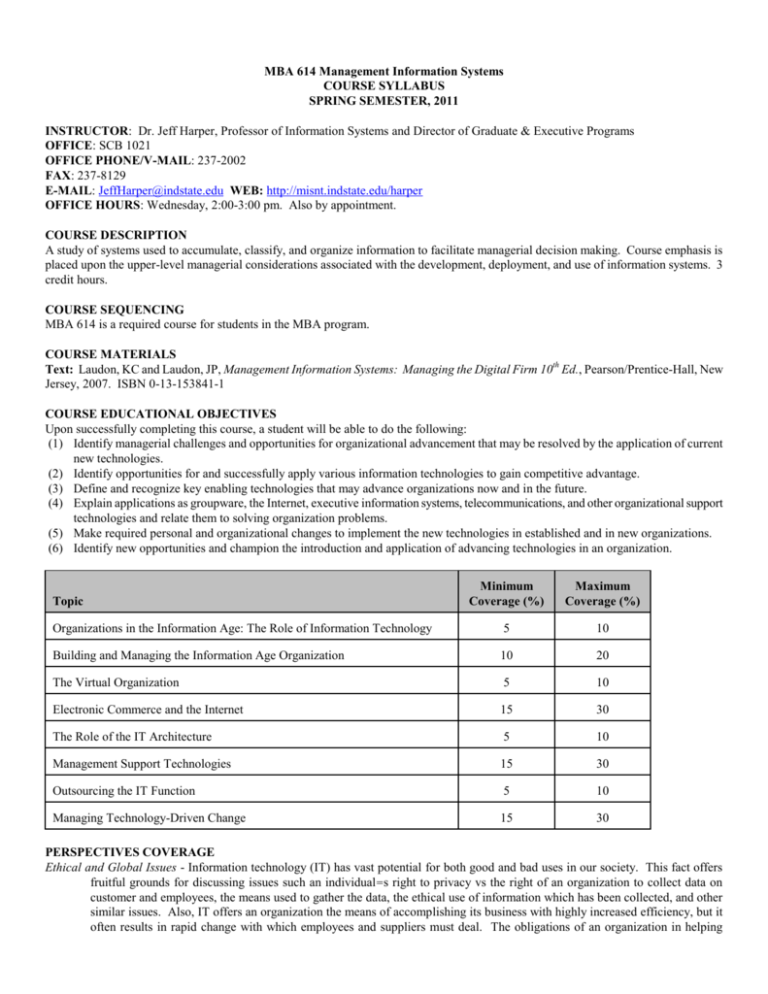
MBA 614 Management Information Systems
COURSE SYLLABUS
SPRING SEMESTER, 2011
INSTRUCTOR: Dr. Jeff Harper, Professor of Information Systems and Director of Graduate & Executive Programs
OFFICE: SCB 1021
OFFICE PHONE/V-MAIL: 237-2002
FAX: 237-8129
E-MAIL: JeffHarper@indstate.edu WEB: http://misnt.indstate.edu/harper
OFFICE HOURS: Wednesday, 2:00-3:00 pm. Also by appointment.
COURSE DESCRIPTION
A study of systems used to accumulate, classify, and organize information to facilitate managerial decision making. Course emphasis is
placed upon the upper-level managerial considerations associated with the development, deployment, and use of information systems. 3
credit hours.
COURSE SEQUENCING
MBA 614 is a required course for students in the MBA program.
COURSE MATERIALS
Text: Laudon, KC and Laudon, JP, Management Information Systems: Managing the Digital Firm 10th Ed., Pearson/Prentice-Hall, New
Jersey, 2007. ISBN 0-13-153841-1
COURSE EDUCATIONAL OBJECTIVES
Upon successfully completing this course, a student will be able to do the following:
(1) Identify managerial challenges and opportunities for organizational advancement that may be resolved by the application of current
new technologies.
(2) Identify opportunities for and successfully apply various information technologies to gain competitive advantage.
(3) Define and recognize key enabling technologies that may advance organizations now and in the future.
(4) Explain applications as groupware, the Internet, executive information systems, telecommunications, and other organizational support
technologies and relate them to solving organization problems.
(5) Make required personal and organizational changes to implement the new technologies in established and in new organizations.
(6) Identify new opportunities and champion the introduction and application of advancing technologies in an organization.
Minimum
Coverage (%)
Maximum
Coverage (%)
Organizations in the Information Age: The Role of Information Technology
5
10
Building and Managing the Information Age Organization
10
20
The Virtual Organization
5
10
Electronic Commerce and the Internet
15
30
The Role of the IT Architecture
5
10
Management Support Technologies
15
30
Outsourcing the IT Function
5
10
Managing Technology-Driven Change
15
30
Topic
PERSPECTIVES COVERAGE
Ethical and Global Issues - Information technology (IT) has vast potential for both good and bad uses in our society. This fact offers
fruitful grounds for discussing issues such an individual=s right to privacy vs the right of an organization to collect data on
customer and employees, the means used to gather the data, the ethical use of information which has been collected, and other
similar issues. Also, IT offers an organization the means of accomplishing its business with highly increased efficiency, but it
often results in rapid change with which employees and suppliers must deal. The obligations of an organization in helping
employees deal with such change through education and other means raises ethical issues. As to global issues, IT has the effect of
creating a Asmall world@ in which rapid access to data and information from all over the globe. The World Wide Web is a most
prominent example of this potential. This global impact is considered throughout the course.
Influence of political, social, legal, and regulatory, environmental, and technological issues - The course deals with the management of
technology and how best to develop systems to meet organizations needs. Issues of change and the regulation of the undesirable
consequences of this change are covered. The difficulty of writing realistic regulations to deal with a continuously and rapidly
changing area is also considered in the course. The questions of regulation also include the practices of companies that by their
very products put them in a strong and perhaps monopolistic position in their industry.
Impact of demographic diversity on organizations - Not explicitly covered.
INTEGRATION
Financial reporting, analysis, and markets - Not explicitly covered.
Domestic and global economic environment of organizations - The course includes coverage of the development and implementation of
information systems in both global and domestic settings. Issues involving the ability of information systems to assist in the
breaking down of barriers between nations and the growing world-wide access to e-mail and the Internet make it clear that
organizations operate in a international context in which economic information can be obtained much more readily than in the past.
Creation and distribution of goods and services - Discussion of the different types of information systems found in organizations involves
the consideration of both marketing and manufacturing information systems and their use in organizations. Information impacts
the whole value chain of organizations, and this point is emphasized throughout the course. The topic of electronic commerce and
the Internet allows discussion of new ways of distributing both information about products and selling these products to
consumers.
Human behavior in organizations - Issues of privacy and the ownership of information allow discussion of legal and ethical topics
regarding organizational personnel. Information technology has a great impact on the way work is done and on the abilities of
organizational personnel to change in order to use the technology. Training and organizational change issues are raised by the
consideration of development and implementation of technology. New communications technologies make possible many
revolutionary forms of work, such as virtual organizations and telecommuting. The coverage of the roll of information systems in
such change strategies as reengineering covers workforce issues.
Cross-functional approaches used - Information systems impact on all organization functions and systems. The role of information and
information technologies in all of the functional areas of business is covered.
COMMUNICATION COVERAGE
Written communications - Assignments such as research papers and written case analyses emphasize written communications.
Oral communications - Assignments such as presentations of cases or discussion of problems either individually or in groups emphasize
oral communications. Students are expected to participate in class discussions.
QUANTITATIVE AND COMPUTER COVERAGE
Quantitative analysis - Not explicitly covered.
Computer skills - The MBA program requires that students have basic computer skills, and the focus of this course is not on the further
development of these skills. Rather, the focus is on the capabilities of computer and communications technologies and how
managers can effectively lead their organizations in the use of them. Students are exposed to such technologies as groupware and
Web page development tools, but these are not the focus of the course.
INSTRUCTIONAL RESOURCES
Library Usage - Textbook, library journals, and Internet resources are sufficient to meet student research needs. Articles may be placed on
reserve in the library or otherwise made available to students to update topical coverage.
Computer usage - Students utilize computers for assignments involving word processing and spreadsheets. They are also exposed to
various specialized software, such as groupware and executive support tools. They often use the Internet for research purposes and
e-mail for communication with each other and the professor.
Appropriate instructional technology - Students are encouraged to augment class discussion with real-time Internet access through wireless
connection for their laptops. While laptops are not required, a more robust and meaningful discuss in often allowed by this
additional resource.
COURSE’S RELATIONSHIP TO SCHOOL OF BUSINESS SHARED VALUES
Lifetime learning skills - Students are exposed to changing technology and the impact of this technology on the manner in which work is
done in organizations. They are exposed to many examples of an environment in which change is constant. They gain an
understanding of how to deal with this change and how to help their employees do the same.
Workplace knowledge and skills - Students learn the capabilities and limitations of numerous IT tools that are useful in solving problems
encountered in their work environment. Through class and case discussions, they are exposed to examples of how organizations
have been both successful and unsuccessful in confronting IT problems.
Development of values and ethics is provided through coverage of relevant topics, as was discussed in the section on Ethical and global
issues under Perspectives Coverage above.
Business community connections are emphasized by using case examples of companies in discussing course topics and by having
representatives of companies and companies recruiting on campus speak to classes. Projects also establish connections with realworld application environments.
Teamwork among students is encouraged by having them turn in joint homework assignments and work together on projects. Some in-class
exercises also foster teamwork. Also, coverage of team-based work tools, such as Lotus Notes or Microsoft Outlook, provides
insight into how these tools are used to facilitate work.
ABOUT THE COURSE
This course is designed to enable students to gain the perspectives and abilities that they will need to manage organizations in what is
increasing being known as the information age. As Lynda Applegate points out, the impact of information technology has been felt in the
way organizations are designed and in the way that they are managed. Old models of organization and management, while still very much
alive, are being gradually challenged and changed, and today's manager must be aware of these changes so that they may develop strategies
for integrating the technology that is literally exploding around us into companies in order to gain a competitive advantage and, in a growing
number of cases, in order to survive.
The course will be delivered through a combination of lecture, discussion, and small group work. This course is not designed to make
computer experts out of students. It is designed to encourage you to think about the growing role and importance of information technology
in the business world. Managers need not be power users of hardware and software to effectively lead organizations in the technical aspects
of implementing new technology; highly qualified individuals exist who can be hired for this purpose. I do assume that you know the basics
of computer literacy: how to use a word processor and a spreadsheet, the basic lingo of computing (RAM, bytes, what a modem is, what to
look for in buying a computer, etc.), but this is NOT a hands-on computer course or a course in the nitty-gritty of computing or
communication technologies. Interested students should take other courses should they desire such exposure.
GRADING
Grades will be determined by student performance on the following elements:
Final Examination
40 %
Research Paper/Project
40 %
Group Case Study Reports
20 %
The ranges of points required for each possible grade are as follows:
POINTS
GRADE
POINTS
GRADE
POINTS
GRADE
92-100
A
83-87.99
B
74-78.99
C
88-91.99
B+
79-82.99
C+
Below 74
F
EXAMINATION
The examination will be discussion-based and will cover topics discussed in class. The examination is comprehensive.
RESEARCH PAPER
Students will have the choice of developing a research paper on an emerging technology of their choice or a case study of a firm with
emphasis on an application of information technology or working on a feasibility team regarding a prospective business endeavor. The
choice of a topic should be consistent with the objectives of the course as stated above. The resulting paper will be graded on content
and appropriate use of source citations. Correct use of the English language is required. The paper must be word processed in
Microsoft Word®, and the electronic file containing the report must be submitted along with a hard copy. Further information on this
aspect of the course will be forthcoming. A one-page proposal for this assignment must be approved by the instructor. Papers are due
the week before finals – no exceptions!
CLASS ABSENCES - It is expected that each student will attend all scheduled classes and research/project team meetings. Failure to
do so will result in a significant grade reduction, solely at the instructor’s discretion.
PEER REVIEW – Part of the research/project grade will be determined by peer review. More information regarding peer review will
be presented in class.
ABOUT YOUR INSTRUCTOR:
Jeff Harper is Professor of Management Information Systems and a member of the graduate faculty in the Scott College of Business at
Indiana State University. As Director of Graduate & Executive Programs he oversees the Scott College of Business campus MBA
program, the Professional MBA program offered in the Indianapolis area, the West Central Indiana Small Business Development
Center, executive and international programs associated with the Scott College, and has other leadership responsibilities for the Scott
College. He joined ISU in 1998 after taking the Ph.D. in MIS from Auburn University and also holds a Master of Science in
Management degree, a Bachelor of Science degree in Accounting, and an Associate of Science degree in Business Administration. He
holds the Certified Fraud Examiner professional certification. He has received the College of Business Faculty Achievement Awards
for outstanding teaching (2003) and exemplary service (2008).
Dr. Harper’s teaching experience prior to ISU includes Athens State University (1994-98), Auburn University (1993-95), and the
University of Alabama in Huntsville (1991-93). Dr. Harper has also taught the graduate Electronic Commerce Strategies course at
Harvard University (2008). At present, about 7,000 undergraduate and 400 graduate students have studied under his tuteledge.
An active researcher and consultant, Professor Harper's interests include electronic commerce strategies, aligning information
technology with strategic intent, and technology transfer. He has served as an IT consultant for such organizations as State Farm
Insurance, NASA, the U.S. Department of Justice, the Department of the Navy, Monroe Guaranty Insurance Corporation, BellSouth
Corporation, and Université Hassan II in Mohammedia (Casablanca), Morocco.
Dr. Harper has published about 50 manuscripts and monographs in various academic and industry outlets and has received
considerable national and international attention for his scholarship. His works have led to special appointments in such prestigious
organizations as the Decision Sciences Institute, Harvard University, and State Farm Insurance Company. Each of these varied roles
was brought about through his demonstrated expertise in the field of MIS. Dr. Harper’s research has been versatile in approach and
methodology, including case studies, field experiments, think pieces, and literature reviews. He has shed light on difficult problems
faced by organizations as diverse as insurance companies, commercial banks, hardwood veneer manufacturers, motor speedways, and
mental health facilities. The results of his research have been presented to audiences across the U.S., Central America, North Africa,
and Europe. His papers have appeared in academic publications such as the Decision Sciences Journal of Innovative Education, the
Journal of Information Technology Management, the Review of Business Information Systems, the Journal of Informatics Education
and Research, the Journal of Technology Transfer, the Case Research Journal, the Journal of SMET Education, the Journal of
Computer Information Systems, and the Journal of the International Academy for Case Studies. In addition, he has worked
collaboratively with dozens of colleagues and students to expand knowledge in his discipline.
Prior to entering Academe, Dr. Harper worked in unit and corporate management for major food service corporations and, later, as an
Examiner of Public Accounts for the State of Alabama. At one point or another, he has also worked as a photographer, a butcher, an
art dealer, a pharmacist’s assistant, a Men’s Clothing salesman, a grocery store manager, a lifeguard and swim instructor, and a
bartender.
He and his wife of over 30 years, Cynthia, have three children. Billy is in management in Nashville, Tennessee, Amanda is in banking
in Indianapolis, Indiana, and Allison is an undergraduate student in Insurance and Risk Management in the Scott College. Away from
work, you will likely find Dr. Harper playing golf (15 handicap), at a sporting event, by the pool, or at a concert.

